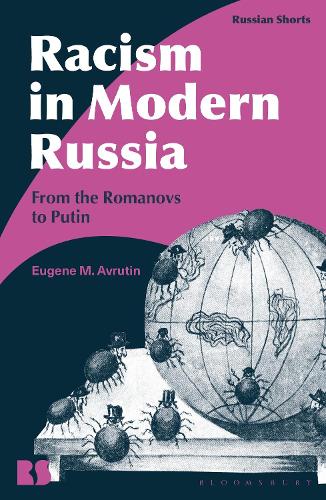
Racism in Modern Russia: From the Romanovs to Putin
(Hardback)
Available Formats
Publishing Details
Racism in Modern Russia: From the Romanovs to Putin
By (Author) Associate Professor Eugene M. Avrutin
Bloomsbury Publishing PLC
Bloomsbury Academic
21st April 2022
United Kingdom
Classifications
Tertiary Education
Non Fiction
European history
305.800947
Physical Properties
Hardback
160
Width 129mm, Height 198mm
286g
Description
In October 2013, one of the largest anti-migrant riots took place in Moscow. Clashes and arrests continued late into the night. Some in the crowd, which grew to several thousand people, could be heard chanting Russia for the Russians with their animus directed towards dark-skinned labor migrants from the southern border. The slogan Russia for the Russians is not a recent invention. It first gained notoriety in the very last years of the tsarist regime, appealing primarily to individuals drawn to the radical right. Analyzing a wide range of printed and visual sources, Racism in Modern Russia marks the first serious attempt to understand the history of racism over a span of 150 years. A brilliant examination of the complexities of racism, Eugene M. Avrutins panoramic book asks powerful questions about inequality and privilege, denigration and belonging, power and policy, and the complex historical links between race, whiteness, and geography. The ebook editions of this book are available open access under a CC BY-NC-ND 4.0 license on www.bloomsburycollections.com.
Reviews
Well written, combining a synthesis of the most recent historiography with the authors original research, this book is long overdue. Despite many conceptual and archival innovations in the field of Russian imperial and Soviet history, race and racism have always remained the last bastions for those who insisted on Russias special historical path. Avrutin helps the reader to think about race in Russian and Soviet imperial formations as a form of rationalizing, organizing, and controlling messy human diversity. This concise book covers the science of race, politics of race, ideologies of race, various racialized social experiences, and racial violence, but it does not offer a linear narrative. Instead Avrutin shows how different combinations and applications of the above depended on a specific context (the Jewish question; Yellow peril; Soviet nation-building; post-Soviet racism with its fixation on whiteness, and so on). Avoiding using the sophisticated analytical apparatus of critical race theory in the text, Avrutin nonetheless embraces its intersectional approach to race, explicating how social, gender, and class differences were construed and experienced as essentialized qualities of particular imperial and Soviet subjects. In addition, the reader is constantly reminded about the global nature of race, especially in the Soviet part of the narrative, which features protagonists such as W. E. B. Du Bois and other Western and third world travelers to the USSR and dwells on their politics of comparison. The combination of quality of analysis, style, and size makes this book a great source for educators like myself, who until now have had very little to offer our students on a topic as politically pertinent as race and racism in the Russian and Soviet past and the post-Soviet present. This book is also an inspiration for professional researchers interested in exploring Russian and Soviet experiences through the lens of race. * Marina Mogilner, Edward and Marianna Thaden Chair in Russian and East European Intellectual History; Associate Professor of History, University of Illinois at Chicago, USA *
Written by a leading expert on the issue of race in Russia, this innovative book treats race as a lens through which to investigate fluctuating discriminatory and exclusionary discourses and practices, thus going beyond the understanding of race as a stable biological category. In so doing it offers an excellent overview of the discourses and practices of race in Russia from the imperial era to the post-Soviet period. * Vera Tolz, Professor of Russian Studies, University of Manchester, UK *
Author Bio
Eugene M. Avrutin is the Tobor Family Endowed Professor of Modern European Jewish History at the University of Illinois, Urbana-Champaign, USA. He is the author and co-editor of several award-winning books, including Jews and the Imperial State: Identification Politics in Tsarist Russia (2010) and The Velizh Affair: Blood Libel in a Russian Town (2018). Most recently, he edited, with Elissa Bemporad, Pogroms: A Documentary History (2021).
